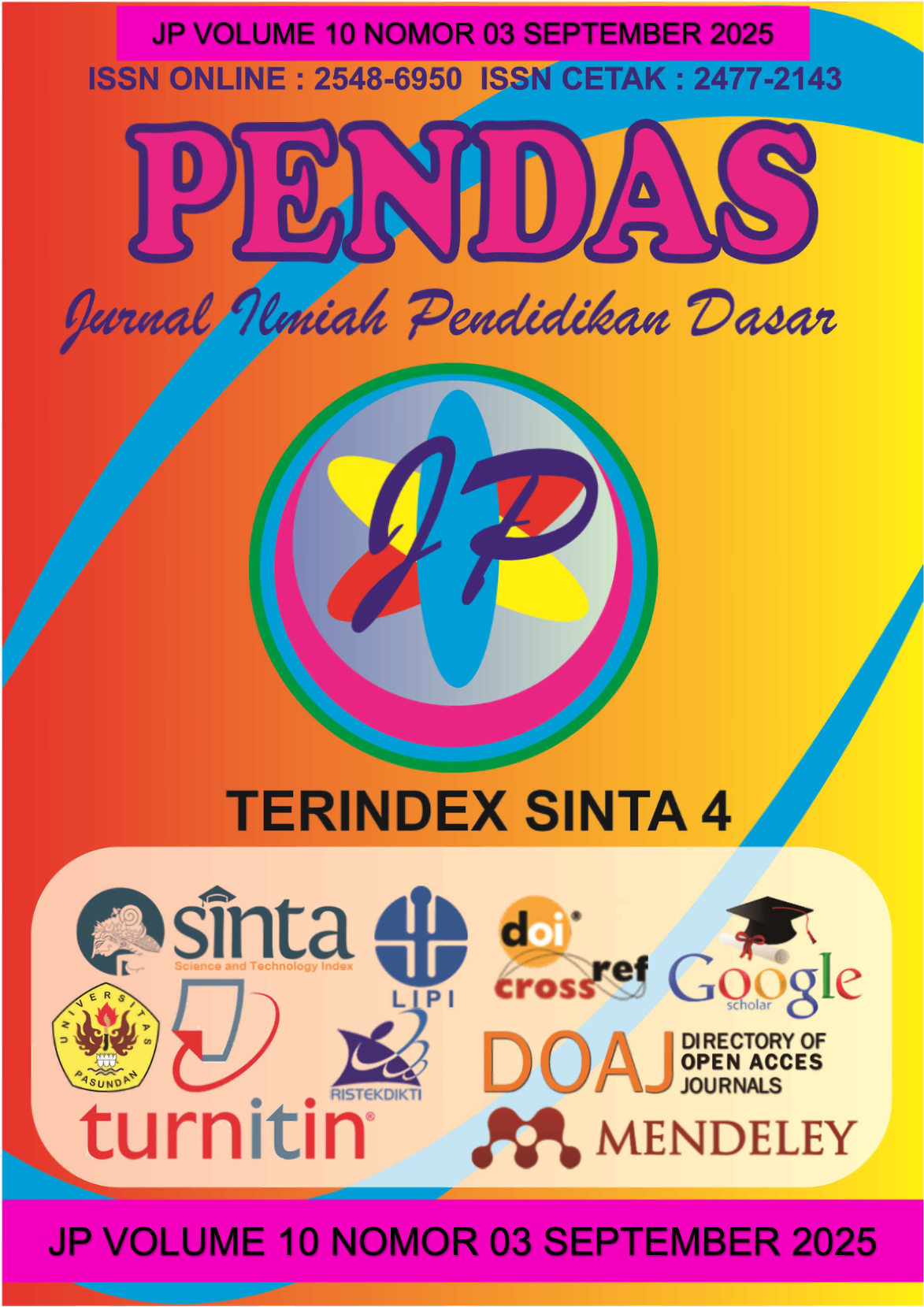IMPLEMENTASI PENDIDIKAN AKHLAK ANAK SEKOLAH DASAR DALAM KELUARGA MENURUT PERSPEKTIF ISLAM
DOI:
https://doi.org/10.23969/jp.v10i03.32074Keywords:
Education, Moral, Islamic Perspective.Abstract
Moral education is the foundational pillar in the sustainable development of a child’s
character. From an Islamic perspective, the family plays a crucial role as the first
and foremost institution responsible for instilling moral and ethical values. This study
aims to understand how moral education is implemented within the family
environment according to Islamic teachings, as well as to identify effective strategies
that parents can apply. This research employs a descriptive qualitative method
through a literature review approach. Data were collected from various sources,
including books, academic journals, articles, and official documents relevant to the
topic, and then analyzed thematically. The findings indicate that moral education in
the family can be implemented through five main methods: exemplary behavior
(uswah hasanah), habituation (ta’dib), advice and dialogue (mau’izhah), supervision
(riqābah), and educational discipline (taqwīm). Each of these methods is strongly
rooted in Islamic teachings, as derived from the Qur’an, Hadith, and the thoughts of
scholars such as Imam Al-Ghazali. The study also shows that active parental
involvement, effective communication, and exemplary daily behavior significantly
influence the development of children’s moral character. Early moral education is
essential in shaping a generation that is not only intellectually capable but also
morally upright. Therefore, the family must serve as the primary agent in
implementing moral education aligned with Islamic values.
Downloads
References
of Interactive Google Sites-Based
Learning Media on Students’
Conceptual Understanding.
Indonesian Journal of STEM
Education, 6(2), 55–62.
Lestari, A., Bina, A., Fauziyah, L.,
Abdullah, A. D., Sifa, F.,
Musthofa, M. B., Islam, U.,
Sunan, N., & Surabaya, A.
(2024). Peran keluarga dalam
membentuk akhlak yang baik
pada anak di desa wonocolo.
8(6), 483–487.
Musolin, M., & Nisa’, K. (2021).
Pendidikan Masa Pandemik
Covid 19: Implementasi Konsep
Tri Pusat Pendidikan Ki Hajar
Dewantara. Edukatif : Jurnal Ilmu
Pendidikan, 3(6), 4134–4144.
https://doi.org/10.31004/edukatif.
v3i6.1316
Muzaki, I. A. (2024). Peran Keluarga
dalam Membentuk Akhlak Mulia
pada Remaja Muslim. 31(02), 52–
62.
Nurwahid Ihsanudin. (2023).
PENDIDIKAN ISLAM DALAM
PERSPEKTIF HADITS; Kajian
Konsep al-Tarbiyah, al-Ta´lim, al-
Ta´dib dan al-Tazkiyah. Al-Ihda’ :
Jurnal Pendidikan Dan
Pemikiran, 17(2), 795–803.
https://doi.org/10.55558/alihda.v1
7i2.74
Pokhrel, S. (2024). Urgensi
Pendidikan Akhlak Budi Pekerti
Sebagai Pondasi dalam
Perspektif Islam. Αγαη, 15(1), 37–
48.
Safitri, D., & Diana, R. R. (2023).
Pendidikan Akhlak dalam
Keluarga (Studi Kasus Pola Asuh
Orang Tua dalam Internalisasi
Akhlak Anak Usia Dini). Jurnal
Obsesi : Jurnal Pendidikan Anak
Usia Dini, 7(5), 6439–6452.
https://doi.org/10.31004/obsesi.v
7i5.3655
Siti Rahmah. (2021). Akhlak Dalam
Keluarga. Alhadharah: Jurnal
Ilmu Dakwah, 20(2), 27–42.
antasari.ac.id/index.php/alhadhar
ah/article/view/5609
Syifa Salma. (2024). Pentingnya
Peran Orang Tua Dalam
Pendidikan Karakter Anak.
Protasis: Jurnal Bahasa, Sastra,
Budaya, Dan Pengajarannya,
3(1), 101–108.
https://doi.org/10.55606/protasis.
v3i1.142
Vany, T., Pasaribu, A., & Sultani, D. I.
(2024). Pola pendidikan akhlak
anak dalam keluarga. 3(1), 2459–
2464.
Downloads
Published
Issue
Section
License
Copyright (c) 2025 Pendas : Jurnal Ilmiah Pendidikan Dasar

This work is licensed under a Creative Commons Attribution 4.0 International License.



















